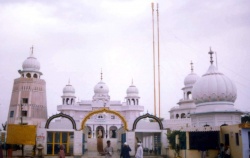Template:Did you know: Difference between revisions
From SikhiWiki
Jump to navigationJump to search
Hari singh (talk | contribs) No edit summary |
Hari singh (talk | contribs) No edit summary |
||
| Line 1: | Line 1: | ||
---- | ---- | ||
{{aowhy|[[Template:Did you know|Did you know...]]}}<div style="background-color:#FFFFEC;"> | {{aowhy|[[Template:Did you know|Did you know...]]}}<div style="background-color:#FFFFEC;"> | ||
*.... that [[ | * .... that [[Pandit Kirpa Ram]] was at the head of the group of [[Kashmiri Brahmins]] who came to see [[Guru Tegh Bahadar]] at [[Anandpur sahib]] in May 1675 for protection against the atrocities of [[Aurangzeb]]. Also that Pandit ji was [[Guru Gobind Singh|Guru Gobind Singh's]] [[Sanskrit]] teacher. | ||
*....that the '''[[Panj Piare]]''' ('''five beloved ones''') is the name given to the five [[Sikh]]s, [[Bhai Daya Singh]], [[Bhai Dharam Singh]], [[Bhai Himmat Singh]], [[Bhai Mukham Singh]] and [[Bhai Sahib Singh]] who took [[Amrit]] in [[1699]]... | |||
[[Image: | [[Image:DamdamaSahib1.jpg|thumb|250px|right|'''Sri Damdama Sahib''']] | ||
*....that '''[[ | *.....that '''[[Takhat Damdama Sahib]]''' is one of five [[takhat]]s or '''Seat of Authority''' of the [[Sikh]]s. This [[takhat]] is situated at [[Batinda]] in [[Punjab]], [[India]] and is the place where [[Guru Gobind Singh]], the tenth Guru of the [[Sikh]]s prepared the full version of the [[Sikh Scripture]]s called [[Sri Guru Granth Sahib]] in 1705. What are the names of the other four [[Takhat]]s? | ||
*.... that | *.... that '''[[Bhai Joginder Singh Riaar]]''' Ji (Ludhiana wale) and partners are a [[ragi]] [[jatha]] who are well known to most [[Sikhs]] globally. Bhai sahib is from [[Gurdaspur]] district in [[Punjab]] and is an exceptional vocalist and very able [[harmonium]] player and they have enlightened [[sangat|Guru-ki-sangat]] in [[India]] and other parts of the world with their beautiful [[kirtan]]. | ||
*.... that | *.....that the [[Sikh Beliefs|'''Sikhs believe''']] that all life, including human life, '''comes from God'''. God is the Creator of the universe and the force that keeps it in existence. | ||
* | *.... that '''[[Langar]]''' is a '''free Sikh kitchen''' which was started by the first [[Sikh Guru]], [[Guru Nanak Dev]] Ji in the fifteenth century. It is designed to uphold the principle of equality between all people of the world regardless of their religion, caste, colour, creed, age, gender or social status. In addition to the ideals of equality, the tradition of Langar expresses the ethics of '''sharing, community, inclusiveness and oneness''' of all humankind. "..the Light of God is in all hearts", said Guru Nanak (SGGS 282) | ||
*.... that '''[[Bani]]''' ([[Punjabi]] {{pa|ਬਾਣੀ}}) is short for '''[[Gurbani]]''' (Punjabi {{pa|ਗਰਬਾਣੀ}}) and is the term used by [[Sikh]]s to refer to various sections of the [[Holy Text]] that appears in their several [[Holy Book]]s. These [[Bani]]s are often found in small [[Gutka]]s or Small Books containing sections of [[Gurbani]]. | |||
<!----------------------------------Disabled ----------------------- | <!----------------------------------Disabled ----------------------- | ||
* .... that [[Pandit Kirpa Ram]] was at the head of the group of [[Kashmiri Brahmins]] who came to see [[Guru Tegh Bahadar]] at [[Anandpur sahib]] in May 1675 for protection against the atrocities of [[Aurangzeb]]. Also that Pandit ji was [[Guru Gobind Singh|Guru Gobind Singh's]] [[Sanskrit]] teacher. | * .... that [[Pandit Kirpa Ram]] was at the head of the group of [[Kashmiri Brahmins]] who came to see [[Guru Tegh Bahadar]] at [[Anandpur sahib]] in May 1675 for protection against the atrocities of [[Aurangzeb]]. Also that Pandit ji was [[Guru Gobind Singh|Guru Gobind Singh's]] [[Sanskrit]] teacher. | ||
Revision as of 15:59, 18 April 2009
Did you know...
- .... that Pandit Kirpa Ram was at the head of the group of Kashmiri Brahmins who came to see Guru Tegh Bahadar at Anandpur sahib in May 1675 for protection against the atrocities of Aurangzeb. Also that Pandit ji was Guru Gobind Singh's Sanskrit teacher.
- ....that the Panj Piare (five beloved ones) is the name given to the five Sikhs, Bhai Daya Singh, Bhai Dharam Singh, Bhai Himmat Singh, Bhai Mukham Singh and Bhai Sahib Singh who took Amrit in 1699...
- .....that Takhat Damdama Sahib is one of five takhats or Seat of Authority of the Sikhs. This takhat is situated at Batinda in Punjab, India and is the place where Guru Gobind Singh, the tenth Guru of the Sikhs prepared the full version of the Sikh Scriptures called Sri Guru Granth Sahib in 1705. What are the names of the other four Takhats?
- .... that Bhai Joginder Singh Riaar Ji (Ludhiana wale) and partners are a ragi jatha who are well known to most Sikhs globally. Bhai sahib is from Gurdaspur district in Punjab and is an exceptional vocalist and very able harmonium player and they have enlightened Guru-ki-sangat in India and other parts of the world with their beautiful kirtan.
- .....that the Sikhs believe that all life, including human life, comes from God. God is the Creator of the universe and the force that keeps it in existence.
- .... that Langar is a free Sikh kitchen which was started by the first Sikh Guru, Guru Nanak Dev Ji in the fifteenth century. It is designed to uphold the principle of equality between all people of the world regardless of their religion, caste, colour, creed, age, gender or social status. In addition to the ideals of equality, the tradition of Langar expresses the ethics of sharing, community, inclusiveness and oneness of all humankind. "..the Light of God is in all hearts", said Guru Nanak (SGGS 282)

